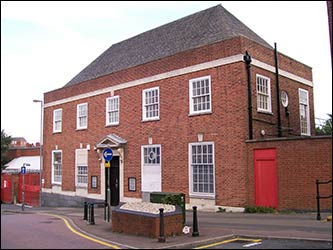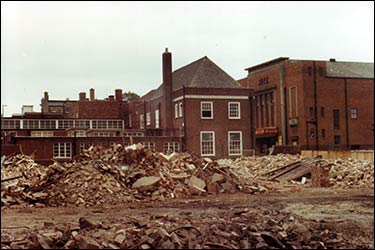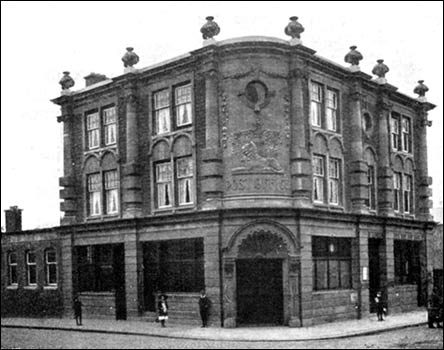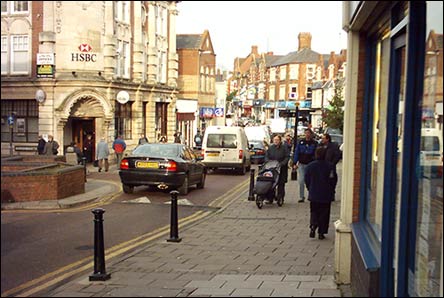The Rushden Echo and Argus, 30th August, 1940, transcribed by Gill Hollis
Human Touches At New Post Office
Fine Premises at Rushden - Partial Protection Against Bombs
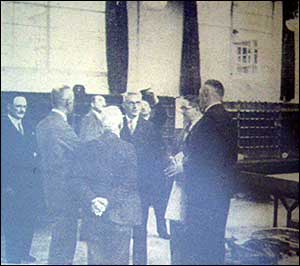 |
|
In the sorting office
|
|
Rushden’s new post office, opened to the public on Monday, looks ahead 20 years in its capacity to handle an expansion of business. It also provides against more immediate problems, for a portion of the upper floor has been strengthened with a concrete slab through which, it is said, a bomb could not penetrate.
War conditions ruled out a formal opening, but a few visitors, headed by the Chairman of the Council (Mr. J. Allen, J.P.), inspected the premises on Monday afternoon. They soon realised that the new building, though less ornate than the one now left deserted a few yards away, is much larger and offers more convenience on both sides of the counter. The customer even sits down to write his telegram.
Like many other post offices, Rushden’s is designed in a modern rendering of the Georgian style and “carried out with due regard to the amenities of the district and the traditions of the neighbourhood.” Multi-coloured facing bricks with stone dressings have been used for the unobtrusive exterior.
The public office is 24 feet square, which means, in comparison with the old office, a longer counter, more space behind it, and much more room on the public side, where the row of chairs and the writing stall built at chair height proclaim the G.P.O. in its most human mood.
Improved Ideas
One of the modern touches about the green-topped counter is the building-in of the parcels weighing machine so that the platform is all but flush with the surface. There isn’t much lifting to do.
Parcels and packets go quickly out of sight down chutes, and telegrams disappear through a hatch. There is no need to worry about the further progress of the telegram, for a bell rings automatically when the hatch is opened, and someone has to pay attention.
The maddening spectacle of a lady clerk sucking a pencil and ignoring a queue of customers is now, it appears, a thing of the past. The girl behaving so heartlessly – so it seemed – in the old office was balancing her accounts. She was really off duty, but had no place of seclusion in which to check her takings. In the new office she merely removes the loose inner shell of her own metal stamp drawer and carries it off – cash and everything – into a quiet balance room. All being O.K., as usual, she slides her drawer into her own compartment of the big safe and locks it up with her own exclusive key – all this without a single customer having soured his soul.
Another point about the public office is the excellent lighting. The floor is laid in terrazzo work and the walls are oak panelled.
The telegram room is pleasant but unimpressive, because the only apparatus required is a telephone. Telegrams in and out of Rushden are merely spoken between Rushden and Northampton.
Behind the telegram room is one for the messenger boys. The post-master’s room is a pleasant place within handy reach of the public office, and the strong room has some interesting features.
The largest department is the sorting office, a fine room 50 by 30 feet with roof lighting and giving ample space for the new equipment which is to be installed as soon as possible. At present the sorting racks in use are those transferred from the old office. The stamp cancelling machine can postmark and count letters at the rate of 450 a minute.
Laid with Maplewood flooring, the sorting office is served by a raised loading bank which is covered by a glass canopy.
Part of the ground floor is devoted to rooms for the male staff – retiring rooms for postmen and sorting clerks, an A.R.P. refuge, complete with telephone, and even a kitchen. Postal staffs eat many meals on the premises.
The large yard is flanked with sheds for cycles and handcarts and rooms for the use of post engineers. A garage is also provided for.
Two public telephone boxes – one equipped and one empty – are built-in near the main entrance.
Scope of Business
Central heating by radiators and pipes goes out from the big basement, which also contains the apparatus for a constant hot water supply to the domestic departments.
Part of the building is of two storeys, and the upper floor contains “new” and “old” stores, (for documents which have to be kept up to 20 years), besides a set of rooms – again including a kitchen – for the lady employees. There are such thoughtful details as boot racks, and each member of the staff has a personal locker.
The inspecting party on Monday included the Council Chairman and Mrs. Allen, Mr. W. L. Beetenson (Clerk of the Council) and Mrs. Beetenson, Mr. R. W. Clark (head postmaster, Wellingborough) and Mrs. Clark, Mr. P. R. Wilkins (Wellingborough post office) and Mrs. Wilkins, Mr. R. C. Henderson, from H.M. Office of Works, Mr. H. J. O’Connor (clerk of the works), Mr. E. H. Forrester (formerly postmaster at Rushden, now retired) and Mrs. Forrester, Mr. H. J. Golesworthy (acting postmaster for Rushden) and Mrs. Golesworthy.
Receiving the visitors, Mr. Clark surveyed the business done at the Rushden post office during 1939:
|
2,031,432 letters and 123,500 parcels posted; |
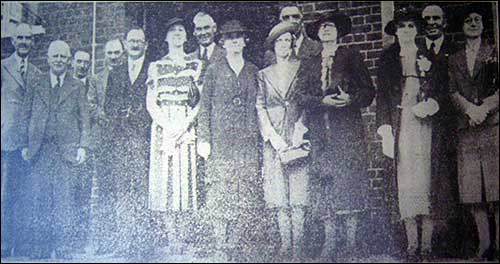 |
|
On the loading platform behind the sorting office
|
|
|
2,317,900 letters and 120,588 parcels delivered; |
|
£8,158 postage stamps sold; |
|
£31,418 insurance stamps sold; |
|
14,851 Army and Navy allowances paid; |
|
29,479 old age pensions paid; |
|
77,948 postal orders issued; |
|
27,570 postal orders paid; |
|
1,374,000 telephone calls dealt with; |
|
2,973 wireless licences issued; |
|
6,246 telegrams sent; |
|
7,739 telegrams received; |
|
£9,000 savings certificates issued; |
|
6,560 savings bank transactions; |
|
2,651 money orders issued; |
|
1,617 money orders paid; |
The Nerve Centre
Mr. Clark described the post office as a “nerve centre.” The old building, he said, had become entirely inadequate, but the new one was worthy of the importance of the town.
Councillor Allen said the growth of postal business at Rushden must have been marvellous during the last 40 or 50 years. He was sure the new building was wanted, and the public would greatly appreciate the postal authorities having at last awakened to the fact that Rushden was a vastly growing town and that the extent of the business warranted a better office than they had had in the past. The populace would be delighted with the fine building and postal service now placed at its disposal.
The postal officials afterwards pointed out the features of the building, and Mr. Golesworthy, who assumed local charge last October, explained many details of organisation. After tea had been served Mr. Allen thanked the head postmaster and the Rushden staff for their courtesy and hospitality.
Messrs. H. C. Janes, of Luton, were the general contractors for the building. Mr. A. Bulloch, of H.M.O.W. was the architect in charge of the building works, and Mr. W. H. Hooson, also of H.M.O.W., was engineer in charge of the heating installation.
|


